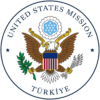Avoid Scams
If you have been contacted by or on behalf of a loved one in Türkiye who finds themselves in an emergency situation, we can help. But first, continue reading to rule out the possibility that you may be the victim of a romance scam.
First, consider the following questions:
- Did you meet your loved one online?
- Have you been unable to meet in person?
- Has your loved one been arrested at the airport or hospitalized?
- Has your loved one or someone acting on his/her behalf asked you for money to assist?
If you answered yes to one or more of the above questions, you may be the victim of a romance scam. U.S. Mission Türkiye receives as many as 100 inquiries a month that turn out to be romance scams. It is not unusual for a scammer to spend months or even years building a relationship before ever asking for money. You can read more about them here and here.
What should you do?
- Remain calm
- Do not send money
- If they require assistance, have your loved one contact the nearest Embassy or Consulate directly.
- U.S. Embassy Ankara
Ankara-ACS@state.gov
Phone: + 90-312-294-0000 - U.S. Consulate General Istanbul
ACS_Istanbul@state.gov
Phone: + 90-212-335-9000
- U.S. Embassy Ankara
- Do you own detective work? Use websites like http://www.scamdigger.com/ and http://www.tineye.com/ to search for any photos your contact might have sent to see if they have been previously used in scams or sourced online.
- Contact the nearest Embassy or Consulate by email and provide them your friend’s name, date of birth, and passport number.
Did you know?
- The U.S. Embassy and Consulates in Türkiye do not refuse service to U.S. citizens in distress.
- The Privacy Act of 1974 prohibits the release of information regarding a U.S. citizen without their express written consent.
- The U.S. Embassy and Consulates in Türkiye receive direct notice of any U.S. citizen arrests and provide consular assistance as early as possible.
- The U.S. Department of State Guide to International Financial Scams contains descriptions of common scams, with sample e-mails and letters sent by perpetrators: https://travel.state.gov/content/travel/en/international-travel/emergencies/international-financial-scams.html.


